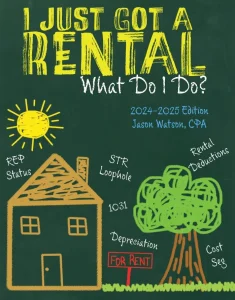
Business Advisory Services
Everything you need to help you launch your new business entity from business entity selection to multiple-entity business structures.
Hey - Our site just had a makeover and we are sorting through the hiccups!
Hey - Our site just had a makeover and we are sorting through the hiccups!

Everything you need to help you launch your new business entity from business entity selection to multiple-entity business structures.

Designed for rental property owners where WCG CPAs & Advisors supports you as your real estate CPA.

Everything you need from tax return preparation for your small business to your rental to your corporation is here.

Table Of Contents

 WCG CPAs & Advisors updates our rental property book, “I Just Got A Rental, What Do I Do?” periodically to reflect new IRS guidance and real-world issues that affect investors. This edition highlights three timely updates—grouping short-term rentals, paying your children from the rental, and using cost segregation to improve cash flow. Each topic touches on a different angle of how smart tax planning helps real estate owners preserve tax deductions, maximize long-term returns, and build wealth.
WCG CPAs & Advisors updates our rental property book, “I Just Got A Rental, What Do I Do?” periodically to reflect new IRS guidance and real-world issues that affect investors. This edition highlights three timely updates—grouping short-term rentals, paying your children from the rental, and using cost segregation to improve cash flow. Each topic touches on a different angle of how smart tax planning helps real estate owners preserve tax deductions, maximize long-term returns, and build wealth.
Sidebar: When we say real-world issues, we must give credit to our prospective and current clients who ask all kinds of questions. Reality is stranger than fiction, right?
The buttons below will take you to expanded versions of each of these rental property topics.
Short-term rental owners often ask whether they can group their short-term rental properties with long-term properties to make it easier to meet material participation thresholds. The answer is no—and that distinction is critical for proper tax reporting.
If your average guest stay is seven days or less, the IRS classifies the property as a business, not a rental. Treasury Regulation 1.469-1T(e)(3)(ii) makes it clear that these activities are “non-rental,” which means they cannot be grouped with long-term rentals under the real estate professional rules in Treasury Regulations 1.469-9(g).
Sidebar: This is part and parcel the reason why your hours spent on a short-term rental do not count towards the 750 hours needed for real estate professional status. In other words, an STR is more like a hotel than a rental, and hotels are not considered real estate activities.
You can still group short-term rentals together under Treasury Regulations 1.469-4 if they form an “appropriate economic unit,” such as properties you manage yourself in similar markets. However, mixing them with traditional rentals—those with average stays over 30 days—can break the grouping election and create exposure if reviewed by the IRS.
Grouping is usually done to help meet one of the material participation tests. As a refresher, here are the big 3-
A real estate CPA, such as those on WCG’s Rental Expert Pod, can help you document time correctly and determine which chores, duties and tasks count towards material participation.
Another July update focuses on a practical family strategy—employing your children to help with rental properties. Whether they manage online listings, paint, or assist with maintenance, paying them can shift income within the household and generate meaningful tax savings when handled correctly. Sure, you can’t get them to clean their own room, but the rental? That’s a snap, right?
Parents can pay each child up to the standard deduction amount—$15,000 for 2025—without creating taxable income for Junior. That money becomes a deductible business expense to the rental property if the work is legitimate, documented, and paid at a reasonable rate. What is a reasonable rate? $50 an hour is unlikely. $25? $30?
There are three main ways to do it:
Documentation is critical. Keep timecards, job descriptions, and pay records showing that the arrangement is bona fide. Paying a teenager $15,000 might mean about 500 hours of real work which is 10 hours a week, every week—so the tasks and hours must make sense.
When structured properly, employing your children becomes one of the most practical rental property tax benefits available. At a 24% marginal rate, paying a child $15,000 could save the parents roughly $3,600 in taxes while giving the child valuable work experience and the opportunity to fund a Roth IRA. Maybe tuck some money away for college or for their first home purchase.
WCG CPAs & Advisors’ rental property CPA team in conjunction with our amazing payroll team often helps clients set up payroll systems and determine reasonable wages to keep these family strategies compliant and effective.
The final July update revisits cost segregation, a technique that accelerates depreciation through 100% bonus depreciation or Section 179 expensing to improve early-stage cash flow. It doesn’t increase your total deductions—it simply moves more of them to the front of your ownership timeline.
For instance, a $700,000 property with $500,000 of building value might generate $100,000 in accelerated depreciation through a cost segregation study. At a 24% marginal tax rate, that equates to a $24,000 immediate tax savings. Reinvesting that cash or paying down debt sooner enhances long-term returns.
The strategy works best when you can use the tax deductions right away—either through the short-term rental loophole or by qualifying as a real estate professional. Investors limited by passive activity loss rules may still carry forward the benefit or realize it upon sale.
Cost segregation also requires planning for the future. Large first-year deductions mean smaller ones later, so understanding your income trajectory and exit timeline is essential. A seasoned real estate CPA can model these effects, helping you decide when acceleration makes the most sense, and when it might not be the best.
Even if you expect to sell within a few years, today’s lower-cost cost seg studies often justify the effort. Spending around $1,000 to unlock tens of thousands in early tax deductions can still produce strong returns, especially when combined with other rental property tax benefits like 100% bonus depreciation or Section 179 expensing.
In short, cost segregation remains a powerful cash-flow tool for investors who plan strategically and document carefully. A rental property CPA firm such as WCG CPAs & Advisors can coordinate the timing of deductions with your overall tax plan to keep both short-term liquidity and long-term compliance in balance.
Each of these updates reflects a broader theme: better tax outcomes come from knowing which rules apply and documenting accordingly. Grouping short-term rentals correctly adjacent to long-term rentals prevents missteps with material participation rules. Paying your children can legally move income within the family while teaching financial responsibility. And cost segregation helps accelerate returns when deployed thoughtfully and strategically.
Working with an experienced real estate CPA ensures your entity structure, elections, and documentation stay compliant as your portfolio grows. Partnering with a knowledgeable rental property CPA helps maintain defensible tax positions, optimize rental property tax deductions, and sustain your rental property tax benefits over time.
WCG CPAs & Advisors remains committed to helping real estate investors make smart, defensible decisions that keep more money working for them and less flowing to the IRS.
 I just got a rental, what do I do? Purchasing a rental property is certainly challenging, but operating one to build wealth and find tax efficiency is equally challenging. This is our second book. Our first book, Taxpayer’s Comprehensive Guide to LLCs and S Corps, was first published in 2014 and was well-received by small business owners and tax professionals, so we thought a book on rental properties and real estate investments would be equally helpful. So, here we are with our second iteration, or the 2025 edition. We update it frequently throughout the year (last update was October 6, 2025).
I just got a rental, what do I do? Purchasing a rental property is certainly challenging, but operating one to build wealth and find tax efficiency is equally challenging. This is our second book. Our first book, Taxpayer’s Comprehensive Guide to LLCs and S Corps, was first published in 2014 and was well-received by small business owners and tax professionals, so we thought a book on rental properties and real estate investments would be equally helpful. So, here we are with our second iteration, or the 2025 edition. We update it frequently throughout the year (last update was October 6, 2025).
Our rental property book starts with entity structures and moves into asset management such as acquisition, cost segregation, rental safe harbors, repairs versus improvements, accelerated depreciation, partial asset disposition, and 1031 like-kind exchange. From there we discuss various rental considerations like passive activity losses, short-term rental loophole, real estate professional status, and material participation including what time counts, and what time doesn’t count.
Finally, the good stuff! Rental property tax deductions such as travel, meals, automobiles, interest tracing, home office and common expenses. Fun!
It is available in paperback for $19.95 from Amazon and as an eBook for Kindle for 15.95. Our book is also available for purchase as a PDF from ClickBank for $12.95.
WCG has a team of real estate CPAs ready to assist you with your rental property and real estate investments. Very few tax professionals and CPA firms specialize in real estate to provide you solid consultation, tax planning including tax reduction strategies, and tax return preparation. We are experts in-
This book is written with the general rental property in mind. Too many resources tell you the general rule but don’t bother to back it up with Internal Revenue Code, Treasury Regulations and Tax Court cases. Our book lays it all out, explains the madness, adds some humor and various conundrums. Example? Water heaters and hot tubs- crazy stuff to consider.
Enjoy! And please send us all comments, hang-ups and static. This book is as much yours as it is ours, except the tiny royalty part- that’s ours. Stop by and we’ll buy you a beer with the pennies.
If you buy our 480-page book and think that we didn’t help you understand rental property tax laws, let us know. We never want you to feel like you wasted your money. If you are ready to add some insightful reading into your day, click on one of the preferred formats. Amazon is processed by Amazon, and the PDF is safely processed by ClickBank who will email you the PDF as an attachment.
 |  |  |
| $19.95 | $15.95 | $12.95 |

Want to talk to us about tax return preparation, tax planning and strategy, and all the other things that go with it? We are eager to assist! The button below takes you to our Getting Started webpage, but if you want to talk first, please give us a call at 719-387-9800 or schedule an discovery meeting.
Jason Watson, CPA is a Partner and the CEO of WCG CPAs & Advisors, a boutique consultation and tax preparation CPA firm serving clients nationwide with 7 partners and over 90 tax and accounting professionals specializing in small business owners and real estate investors located in Colorado Springs.
He is the author of Taxpayer’s Comprehensive Guide on LLC’s and S Corps and I Just Got a Rental, What Do I Do? which are available online and from mostly average retailers.
Table Of Contents

Tax planning season is here! Let's schedule a time to review tax reduction strategies and generate a mock tax return.

Tired of maintaining your own books? Seems like a chore to offload?
Did you have questions about how this works? When cost segregation makes sense and when it doesn't? Paying kids to clean the rental property? Have a specific question about real estate and need a tax expert?
The tax advisors, business consultants and rental property experts at WCG CPAs & Advisors are not salespeople; we are not putting lipstick on a pig expecting you to love it. Our job remains being professionally detached, giving you information and letting you decide within our ethical guidelines and your risk profiles.
We see far too many crazy schemes and half-baked ideas from attorneys and wealth managers. In some cases, they are good ideas. In most cases, all the entities, layering and mixed ownership is only the illusion of precision. As Chris Rock says, just because you can drive your car with your feet doesn’t make it a good idea. In other words, let’s not automatically convert “you can” into “you must.”
Let’s chat so you can be smart about it.
We typically schedule a 20-minute complimentary quick chat with one of our Partners or our amazing Senior Tax Professionals to determine if we are a good fit for each other, and how an engagement with our team looks. Tax returns only? Business advisory? Tax strategy and planning? Rental property support?

Everything you need to help you launch your new business entity from business entity selection to multiple-entity business structures.

Designed for rental property owners where WCG CPAs & Advisors supports you as your real estate CPA.

Everything you need from tax return preparation for your small business to your rental to your corporation is here.


